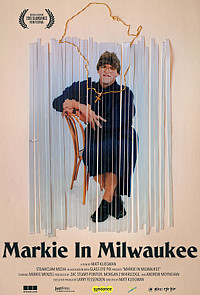| SHADOWS ON THE WALL | REVIEWS | NEWS | FESTIVAL | AWARDS | Q&A | ABOUT | TALKBACK | |||||||||||||
 Shadows off the beaten path Shadows off the beaten pathIndies, foreign, docs and shorts...
On this page:
COLLECTIVE |
BARE |
MARKIE IN MILWAUKEE
| |||||||||||||
| See also: SHADOWS FILM FESTIVAL | Last update 25.Nov.20 | |||||||||||||
|
Bare Review by Rich Cline | 
| |||||||||||||
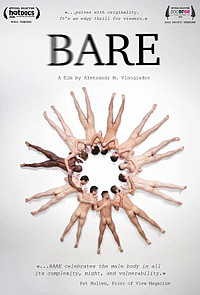 dir-scr-prd Aleksandr M Vinogradov with Thierry Smits, Nelson Reguera Perez, Valentin Braun, Peter De Vuyst, Michal Adam Goral, Oliver Tida Tida, Jari Boldrini, Gustavo Monteiro, Bruno Morais, Emeric Rabot, Theo Samsworth, Davide Guarino, David Zagari release US 13.Nov.20 20/Belgium 1h31 Now streaming... |
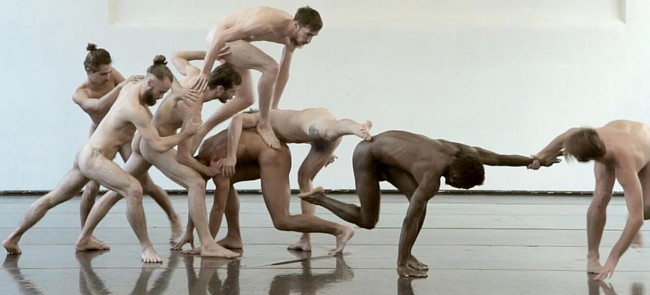 This finely shot and edited documentary follows the auditions, rehearsals and premiere of Belgian choreographer Thierry Smits' extraordinary dance piece Anima Ardens. The hitch is that the dancers are completely naked as they perform a non-traditional dance piece that's acrobatic and amorphous, and remarkably humane. And aside from the unflinching nudity, this film is a fascinating depiction of the production from early try-outs to the first public performance. Almost a year before the premiere date, Smits meets with a group of hopeful male dancers, explaining the project and reminding them that they will need to be very comfortable with nudity. At the start, they're a bit uncomfortable with the fact that there are documentary cameras recording everything, but they soon loosen up, sometimes even playing to the crew. Auditions are brutal, as Smits selects 11 men from eight countries. And rehearsals are athletically demanding. Along the way, Smits crafts the piece into a fascinating look at masculine strength, weakness, compassion and disability. The film is beautifully shot, using wide shots to capture the group scenes, then cutting to extreme close-ups accompanied by offhanded voiceover conversations as the men discus how they feel about the piece, including the freedom of performing without clothing and the occasional comment about their personal lives. It's sometimes deliberately voyeuristic, provoking audience expectations and sensitivities. And the sweaty physicality in rehearsals is extraordinary, as the dancers get used to being so exposed to each other while Smits pushes them to explore shapes and combinations. Because filmmaker Vinogradov's cameras have full access, this film is remarkably intimate, catching both large-scale scenes and quietly private moments. There's a strong sense that these men find this piece both liberating and challenging. And as their camaraderie builds, they also have quite a bit of fun with it, limbering up with a striptease or a bit of helicoptering before getting down to more serious work. Their improvisations are especially intriguing, as they feed into the performance, edited with flickering echoes of classical paintings. With this production, Smits is workshopping a primal idea of how diversity and unity feed into each other, creating a powerful whole from what he calls "different types of animals". Variations in size, hair and skin tone are beautiful, as is the way they interact with each other to create evocative shapes. And it's riveting to watch Smits literally strip these guys back to become "beasts", working with them on a journey into instinct and ritual that can't help but catch the attention.
| ||||||||||||
|
Collective Colectiv Review by Rich Cline |  MUST
MUST  SEE SEE
| |||||||||||||
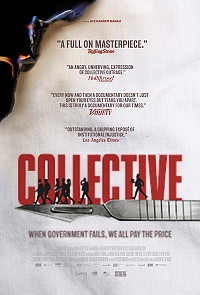 dir Alexander Nanau scr Alexander Nanau, Antoaneta Opris prd Alexander Nanau, Bianca Oana, Bernard Michaux, Hanka Kastelicova with Catalin Tolontan, Mirela Neag, Razvan Lutac, Vlad Voiculescu, Camelia Roiu, Tedy Ursuleanu, Narcis Hogea, Nicolae Banicioiu release Rom 28.Feb.20, US/UK 20.Nov.20 19/Romania Magnolia 1h49 VENICE FILM FEST TORONTO FILM FEST SUNDANCE FILM FEST Now streaming... |
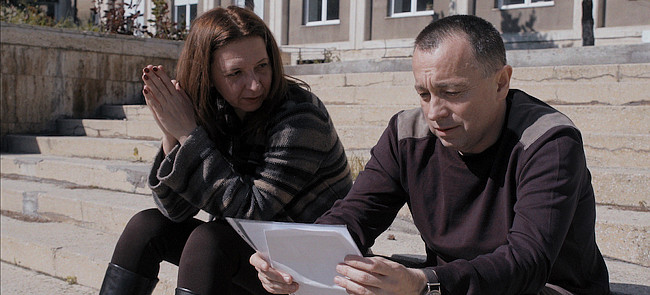 Romanian filmmaker Alexander Nanau assembles this documentary as a deep investigative dive into governmental malpractice. The film is tightly shot and edited as a fast-paced political thriller, building outrage and urgency as it roots out the shocking truth behind a national tragedy. And the issues echo globally, highlighting the disconnect between the rich and powerful and the people they use and callously dispose of to maintain their positions. After a 2015 fire at the Collectiv nightclub in Bucharest, 27 people died due to a lack of safety precautions, and 37 more died due to inadequate health care in hospitals. This led to nationwide protests against systemic corruption. Parents recount heartbreaking firsthand stories about how health officials lied to them and delayed urgent treatment. And doctors blow the whistle about fraud that runs rampant in the system. The articles about this situation, written by Catalin and his colleagues Mirela and Razvan at Gazeta Sporturilor, brought down the government. Briefly. Nanau's access is frankly incredible, as he intimately films Catalin's team as well as the government's health ministry. And footage of the fire is deeply distressing. But victims died of bacterial infections in under-equipped hospitals, rather than burn injuries. The newspaper's investigation discovers that this was caused by severely watered-down disinfectants, and further revelations of bribery, kickbacks and coverups in a system run by "unscrupulous mobsters" lead to the health minister's resignation and the presumed suicide of the owner of the implicated private pharmaceutical company. Watching political leaders squirm, lie and spin the truth is horrifying. As is the fact that eight years of warnings went missing before this investigation. Straight-arrow new health minister Vlad promises to clean up long-standing nepotism, politicisation and conflict of interest that he finds at every level. His openness and dedication to change is refreshing, but he faces resistance from officials who say, "We can't afford a scandal," ignoring the fact that their actions are illegal and dangerous. Meanwhile, the film finds emotional resonance in grieving father Narcis and the severely injured Tedy, who lets her scars speak for her. This is a riveting documentary that can't help but shake trust in politicians, but it also offers hope in the way these unflinchingly honest journalists took them on. It's a vivid depiction of one essential role of the press: to reveal the truth a government is trying to hide. So it's demoralising to see candidates lie blatantly, then get voted into office. And the deeper issue is that many politicians care only about power; they no longer have empathy for people who are dying on their watch.
| ||||||||||||
|
Markie in Milwaukee Review by Rich Cline | 
Now streaming...
|  Shot over 10 years, this sometimes unsettling documentary is an intimate exploration of identity from an usual perspective. Filmmaker Matt Kliegman mixes fly-on-the-wall authenticity with artful observation to create a remarkable portrait of a trans woman caught between herself, her faith and society (note that I'll use female pronouns for Markie). And the strongest aspect is what the film says about religion without ever preaching, as it were. In 2013, after four years documenting Markie's life as a 7-foot tall transgendered woman, Markie tells filmmaker Matt that she has decided to stop her transition and live as a man again. She remembers feeling like a girl from age 8, then realising as a teen in the 1970s that she'd need surgery. Fighting it, she instead became a jock, secretly dressing as a woman at home, then submerged herself into religion and family. But as hard as she tried, she could never pray these deeper feelings away. Although now she's going to try again. The film flickers around Markie's timeline, including her days as a fundamentalist Baptist preacher and her difficult decision to become a woman, which she describes as "choosing life". She never rejects her faith, but the church, her wife and children reject her. Kliegman follows her through the entire process, as Markie discusses various issues, including how it has felt to be so big and tall. Now she longs to reconnect with her adult children, even if it means hiding her female self. Markie is articulate about this complex process, discussing her struggle to accept that her identity is valid. But she develops confidence as a woman, becoming a mentor to other trans women, finding an accepting church and thinking about dating. So even if her reasons are understandable, it's shocking to see her suddenly decide to purge femininity from her life. It's also fascinating to hear Markie's daughter Christina honestly express her own reaction to her father's transition in the context of her family's breakup. The film's most telling aspect is how it touches on how Markie has been conditioned by society and the church to think that her decision broke her family apart, reaping what she sowed with her rebellion against God (false theology her pastor affirms). So being a man again will appease people and reconcile the family, even if she'll be living a lie. This internal battle is powerfully compelling, because it's clear who Markie really is, even as she has conviction about what's right. So watching her fight the truth is wrenching.
| 
See also: SHADOWS FILM FESTIVAL © 2020 by Rich Cline, Shadows
on the Wall
HOME | REVIEWS | NEWS | FESTIVAL | AWARDS
| Q&A | ABOUT | TALKBACK | | ||||||||||

